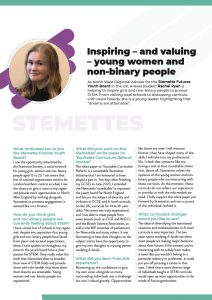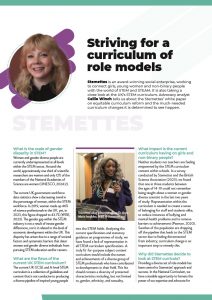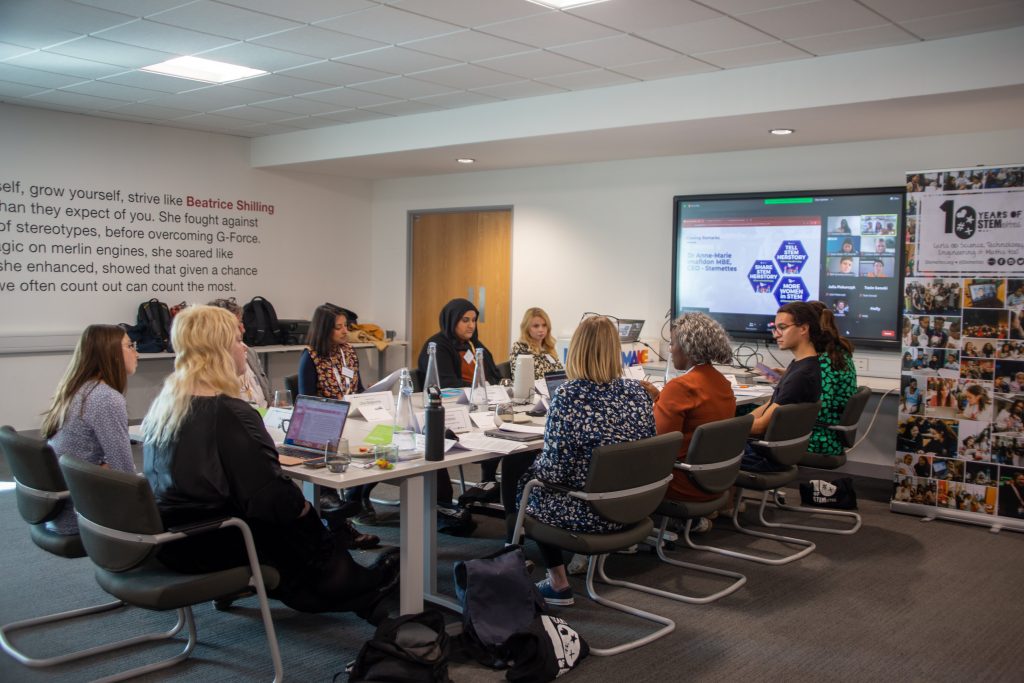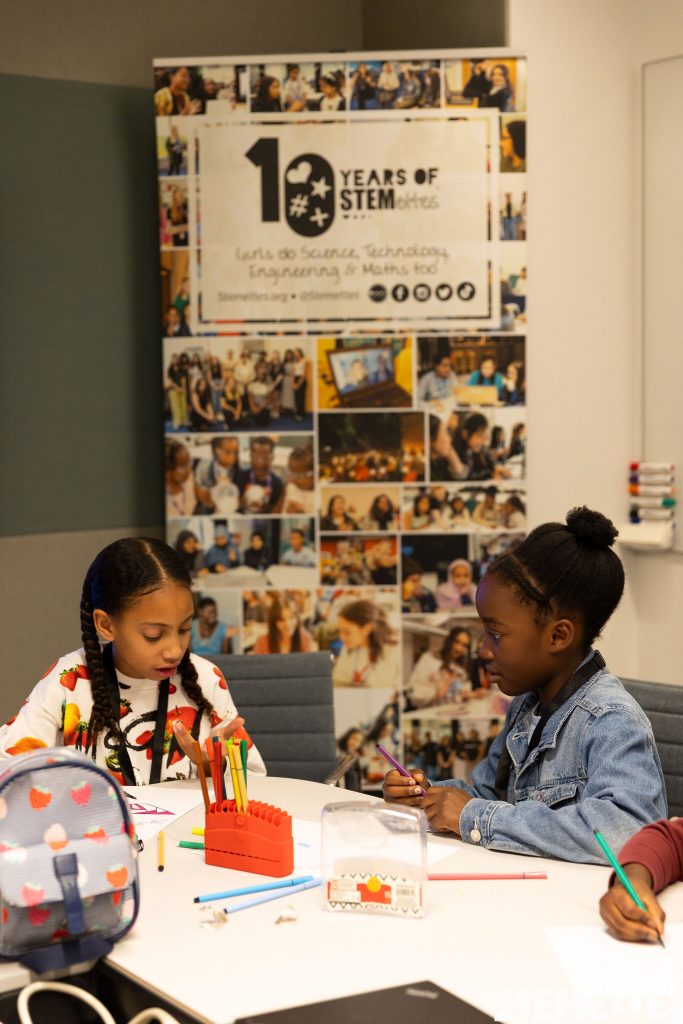Striving for a curriculum of role models
Stemettes is an award-winning social enterprise, working to connect girls, young women and non-binary people with the world of STEM and STEAM. It is also taking a close look at the UK’s STEM curriculum. Advocacy analyst Callie Winch tells us about the Stemettes’ white paper on equitable curriculum reform and the much-needed curriculum changes it is determined to see happen.
What is the scale of gender disparity in STEM?
Women and gender diverse people are currently underrepresented at all levels within the STEM sector. Around the world, approximately one third of scientific researchers are women and only 12% of the members of the National Academies of Science are women (UNESCO, 2024:2).
The current UK government workforce data statistics show a decreasing trend in the percentage of women, within the STEM workforce. In 2019, women made up 46% of science professionals in the UK, yet, in 2023, this figure dropped to 43.7% (WISE, 2023). The gender gap within the STEM industry is not a result of innate gender differences, nor is it related to the level of economic development within the UK. This disparity has arisen due to a range of societal factors and systematic barriers that deter women and gender diverse individuals from pursuing STEM education and/or careers.
What are the flaws of the current UK STEM curriculum?
The current UK GCSE and A-level STEM curriculum is a collection of guidelines and content that is not conducive to producing a diverse pipeline of inspired young people into the STEM fields. Analysing the current specifications and statutory guidance on programmes of study, we have found a lack of representation in all STEM curriculum specifications. A truly fit-for-purpose subject content curriculum would include the names and achievements of a diverse group of STEM professionals who have contributed to developments in their field. This list should contain a diversity of protected characteristics including, but not limited to, gender, ethnicity, and sexuality.
What impact is the current curriculum having on girls and non-binary people?
Neither students nor teachers are feeling empowered by the STEM curriculum content within schools. In a survey conducted by Stemettes and the British Science Association (2023), we found that one in three students between the ages of 14-19 could not remember being taught about a woman or gender diverse scientist in the last two years of study. Representation within the curriculum is needed to create a sense of belonging for staff and students alike, to reduce instances of bullying and mental health problems and to remove barriers to achievement (Pearson, 2020). Swathes of the population are dropping off the pipeline that leads to the STEM sector due to feeling disconnected from industry; curriculum change is an important step to remedy this.
Why did Stemettes decide to look at STEM curricula?
Providing a diverse set of role models has been central to Stemettes’ approach and success. In the National Curriculum, we have a sizeable opportunity to harness the power of our expertise and advocate for change. Reflecting this in the curriculum has been a policy change supported by our network of young people, their peers, educators, parents and guardians, and influencers.
For our tenth birthday, we decided to pick up this mantle and take more direct action on diverse representation in the curriculum, inspired by a 2023 letter written by Dinah Lewis, Jaynie Shah and Ruben Persey to the Secretary of State for Education. Their letter outlined what they had realised through their GCSE and A-level studies – that the curriculum failed to mention the work and achievements of any women scientists. Dinah, Jaynie and Ruben approached Stemettes with the aim of addressing this.
Although the Department of Education has stated that teachers have the flexibility to teach supplementary content about STEM, not all teachers have the capacity to do so. Teachers are time-poor and are trying to get through a lot of content in a strict time frame. Therefore, not all young people learn about a STEM role model they can relate to – an experience that should not be a privilege.
Ultimately, enrichment material should not be needed when there is a curriculum that is suitable for all young people studying it. Although this additional material is being created with the needs of both teachers and young people in mind, it creates a disparity between the young people who have been taught it and those who have not. We need a curriculum that is future-thinking, one that is setting our young people up for success in an uncertain future.
Speaking to our beneficiaries, the few young people who have been taught about a STEM role model who is a woman or a non-binary person have noted that they are often unrelatable, historical figures. This lack of relatability undermines the importance of placing role models within the curriculum content.
Who contributed to the white paper?
Co-chaired by Jaynie, Ruben and Dinah, we hosted three roundtable discussions in 2023: at the US Embassy in London, the Newcastle Civic Centre and Make UK in Birmingham. We were joined by a range of industry representatives and community stakeholders from across the STEM sector and beyond. We wanted to maximise commitments to ensure that women in STEM are proportionally – and rightfully – represented in education.
We sought to include those studying the curriculum, deciding on it, and delivering it, those supporting students, and parent and community groups. We wanted a geo-diverse set of inputs so, in addition to physically hosting the roundtables across the country, we had a set of local voices present.
What support has the white paper had so far?
We launched the white paper at The House of Commons, in line with International Women’s Day 2024 and sponsored by Dawn Butler MP. The event was attended by a range of individuals across industry, institutes, academia, entrepreneurship and government. We’ve had a whole host of support for the white paper from the likes of GSK, MEI, North East Ambulance Services, Coventry University and Lenovo Technology UK and more than 500 downloads.
What are your next steps?
We will push three main ‘calls to action’ for all individuals that are invested in increasing diversity within the STEM field. We are working with a number of stakeholders to ensure this change is top of the list of discussions about curriculum reform. We are also asking for individuals to download the white paper from stemettes.org/whitepaper, to provide a quote of support for the campaign and to share the document with their network. We also ask that once individuals have read and digested the recommendations, they try to and implement them as much as possible.
We will continue to push for equitable representation within the UK STEM curriculum and commit to being available to support policymakers to make this reform a reality. We believe in meaningful action as part of the puzzle that is bringing gender balance to STEM. We also know that not everyone needs a gender-focused activity to reach their full potential. We are working to deconstruct social norms for a historically marginalised online and helps teachers to run their own STEAM clubs through our ‘Stemillions’ cohorts. Our Stemillions club is an extracurricular activity that can be completed at the teacher’s own pace and allows for individuals to get fun, hands-on STEM activities to try in the classroom. Both of these have direct links to the English national curriculum so can be easily integrated into lesson plans to add greater diversity.
What advice do you have for girls and non-binary people who want to know more about opportunities in STEM?
Reach out to organisations such as Stemettes and get involved with the events that are happening. We are here to help you, support you and show you your options. We run events for girls and non-binary individuals aged 5-25, providing fun, free events across the UK and online. If you are between the ages of 13 and 25, you could also join our Stemette Society which is an opportunity to connect with like-minded young women and non-binary young people in a safe and moderated space. It’s a space to discuss things you’ve seen in the Stemettes Zine, experienced at school or have learnt from STEAM events like the ones run by Stemettes.
The Stemettes’ Equitable Curriculum Reform white paper – key recommendations
For government – role models that represent the students:
We recommend that the UK Government includes more and diverse representation, in the form of role models, into the UK GCSE and A-level science, technology, engineering and maths statutory subject content, to allow more young women and non-binary individuals to believe that STEM subjects are attainable.
For institutes – everyday models for everyday people:
We recommend that institutes equitably raise the profiles of their diverse members and to ensure the educational resources they create are accessible and actively inclusive. We need institutes to work more cohesively for their diverse membership to support their work on the ground.
For industry – creating impact at the grassroots level:
We recommend industry to: support grassroot efforts to build their future workforce pipeline, support educational organisations through providing funding to grassroots initiatives and volunteering schemes, and raise the profile of internal role models.
For educators – experience-driven curriculum reform:
We recommend that educators support the campaign to include more and diverse representation within GCSE and A-level STEM statutory curriculum content. Educators should do this by ensuring that teachers feel supported by senior leadership teams and subject leaders and by introducing a ‘whole school equity’ approach.
For parents and carers – rewriting the future:
We recommend that parents and carers work to reframe how they talk about STEM with their young people. Many young people perceive STEM subjects to be exclusively for boys or are only for the highest achievers in school. Parents and carers can help to rewrite this narrative.
Do you have a question for Callie?

Read about the Stemette Futures Youth Board:
www.futurumcareers.com/inspiring-and-valuing-young-women-and-non-binary-people









0 Comments